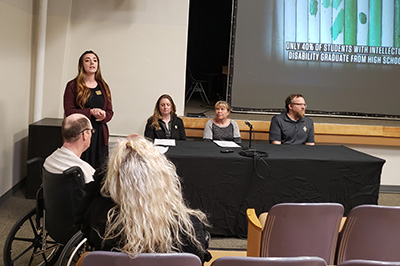Intelligent Lives Comes to Moscow ID (ID UCEDD)
May 28, 2019

|
On March 22nd, the Idaho Center on Disabilities and Human Development (CDHD), in collaboration with the University of Idaho Center for Disability Access and Resources (CDAR), hosted a community screening of the documentary Intelligent Lives, created by Dan Habib. Preceding the event was a resource fair with different resources available on campus and within the Moscow community. Following the screening was a panel discussion addressing questions that were brought up within the film. CDHD brought this documentary to the university to broaden the understanding of intelligence testing and how people with intellectual disabilities are disproving assumptions made about them due to their IQ score.
Dan Habib, an award-winning filmmaker, created the documentary Intelligent Lives to transform the label that comes with a low IQ score from a life of isolation to one of possibility. Intelligent Lives features three young adults with intellectual disabilities, Micah, Naieer, and Naomie. These individuals challenge the perceptions of intelligence as they interact within high school, college, and the workforce.
I was fortunate enough to coordinate this event and to bring this film to Moscow, ID. As a student at the University of Idaho, I noticed there was a disconnect between students and the different resources that are not only on campus but within the community as well. For this reason, I wanted to provide an opportunity for students to learn more about what our community has to offer. We had eight different booths providing information about different diversity organizations. Thirty-six people attended the screening of Intelligent Lives to learn more about the history of IQ testing and how individuals with intellectual disabilities are pushing back against the limiting stereotypes associated with low IQ scores. Following the screening, a panel discussion made up of Amy Taylor, Director of CDAR, Andy Scheef, faculty in Special Education and part of Think College, and Cathy Dixon, UI graduate student, occurred. Questions were asked regarding limitations of IQ testing, the possibility of self-fulfilling prophecy as a result of IQ testing, how universities can be more inclusive, and self-advocacy.
I highly recommend looking into a screening of Intelligent Lives. This documentary is not only interesting and thought provoking, but it can also lead to deeper conversations about how public education and higher education can become more inclusive to individuals with disabilities. To learn more, you can visit the Intelligent Lives website found here: https://intelligentlives.org







